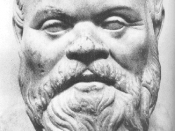The intention of this paper will be to examine Descartes' argument for the existence of God. First, I will review Descartes' proof for the existence of God. Then, I will discuss some consequences that appear as a result of God's existence. Finally, I will point to some complications and problems that exist within the proof. Descartes' proof of the existence of God occurs in the Third Meditation. He builds his entire argument upon his proof in the previous meditation that in order for him to think, he must exist. From this single observation, Descartes notices that the idea of his existence is very clear and distinct in his mind; based upon this clarity and the fact that he has just determined his own existence, he deduces a rule--that the things that he sees as very clear and very distinct are all true. Descartes starts his proof by dividing "thought" into four categories--ideas (concepts), volitions (choices), emotions (desires), and judgments (beliefs).
He then breaks down these categories to discover which type/s of thoughts can yield error. The first thing to realize is that there is no error in an idea. Error can occur only in the judgment of whether the idea is true or false. For example, I may have an idea of what it would be like to burn my finger, but that idea has no rightness or wrongness until I make a judgment as to whether I believe or disbelieve the idea. In other words, having an idea is one thing, but believing it is something different. Concerning emotions and volitions, these forms of thought do not give way to any error either since we can desire or choose anything and not find any error in the fact that I desire it or choose it. Next, Descartes discusses...


